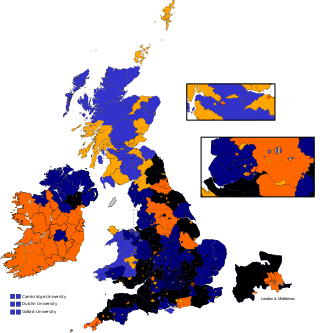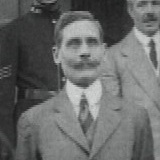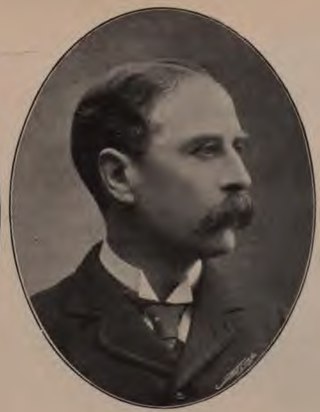
William Henry Bateman Hope (28 March 1865-December 1919) was a British Liberal Party politician.

William Henry Bateman Hope (28 March 1865-December 1919) was a British Liberal Party politician.
He was born in 1865, a son of William Carey Hope of Bath, Somerset. He was educated at Eton before moving on to Trinity College, Cambridge in 1884. He received a BA in 1887. In 1890 he married Agnes Stothert of Bath.
In 1892 he bought Eastwood Manor in East Harptree. He extended the house and had electrical wiring installed making it one of the first in the county of Somerset to have electric lights. [1]
He was admitted to the Inner Temple in 1887. He was Called to the Bar in 1891. He practised on the Western Circuit. He served as a Justice of the Peace in Somerset. He was elected to Somerset County Council in 1898. [2] He contested Somerset North at the General Election of 1900 but did not win. He was elected at the 1906 General Election when he gained North Somerset from the Conservative. He sat for one full term before retiring ahead of the next General Election in January 1910. [3] He was Recorder of Wells from 1907 to 1915. He stood down from Somerset County Council in 1914 after 16 years service. He died in 1919 aged 54. [4]

Bridgwater was a parliamentary constituency represented in the House of Commons of the Parliament of the United Kingdom, until 2010 when it was replaced by the Bridgwater and West Somerset constituency. It elected one Member of Parliament (MP) by the first past the post system of election.

Bath is a constituency in the House of Commons of the Parliament of the United Kingdom represented by Wera Hobhouse of the Liberal Democrats.

Paddington North was a borough constituency in the Metropolitan Borough of Paddington in London which returned one Member of Parliament (MP) to the House of Commons of the Parliament of the United Kingdom, elected by the first past the post voting system. It was created in 1885, and abolished for the February 1974 general election.
Frome was a constituency centred on the town of Frome in Somerset. It returned one Member of Parliament (MP) to the House of Commons of the Parliament of the United Kingdom from 1832, until it was abolished for the 1950 general election. Between 1832 and 1885, it was a parliamentary borough; after 1885 it was a county constituency, a division of Somerset.
Oldham was a parliamentary constituency centred on the town of Oldham, England. It returned two Members of Parliament (MPs) to the House of Commons of the Parliament of the United Kingdom. The constituency was created by the Great Reform Act of 1832 and was abolished for the 1950 general election when it was split into the Oldham East and Oldham West constituencies.
Finsbury East was a parliamentary constituency centred on the Finsbury district of North London, England. It returned one Member of Parliament (MP) to the House of Commons of the Parliament of the United Kingdom, elected by the first past the post system.

East Somerset was the name of a parliamentary constituency in Somerset, represented in the House of Commons of the Parliament of the United Kingdom between 1832 and 1918.
Ramsey was a parliamentary constituency in Huntingdonshire, which elected one Member of Parliament (MP) to the House of Commons of the Parliament of the United Kingdom. It was also known as North Huntingdonshire.

West Somerset or Somerset Western was the name of a parliamentary constituency in the county of Somerset between 1832 and 1885. It returned two Members of Parliament to the House of Commons of the Parliament of the United Kingdom, elected by the bloc vote system.

Sir Thomas Dyke Acland, 11th Baronet, FRS was a British educational reformer and a politician who sat in the House of Commons between 1837 and 1886 initially as a Tory and later, after an eighteen-year gap, as a Liberal.
The 1890 Caernarvon Boroughs by-election was a parliamentary by-election held on 10 April 1890 for the British House of Commons constituency of Caernarvon Boroughs.
Philip Vanderbyl was a qualified doctor, merchant and a Liberal politician.

John William Wilson, PC, JP was a British chemical manufacturer and politician who served for 27 years as a member of parliament (MP), initially as Liberal Unionist and then as a Liberal.

Richard Cornthwaite Lambert was a British barrister and Liberal Party politician

Colonel Sir James William Greig was a British barrister and Liberal Party politician. He sat in the House of Commons from 1910 to 1922.
The Reading by-election was a Parliamentary by-election. It returned one Member of Parliament to the House of Commons of the United Kingdom, elected by the first past the post voting system.

John William Howard Thompson was a British Liberal Party politician, solicitor and soldier.

John Sharp Higham was a British Liberal Party politician and cotton manufacturer.
The Ilkeston by-election was a Parliamentary by-election in Derbyshire. It returned one Member of Parliament (MP) to the House of Commons of the United Kingdom, elected by the first past the post voting system.

Charles Morley, was a British Liberal Party politician.